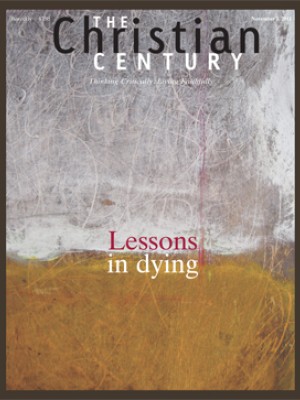Due diligence: A lawyer’s journey to church
"Can I get to know Jesus without the church?" The 54-year-old attorney asked the question with the curiosity of a prospective home buyer checking out a new neighborhood. Larry was one of those people who are drawn toward Jesus but not at all sure they are ready to be a part of a church.
There was no hostility in Larry's question. He had not rejected religion; he simply didn't need it. He had moved along the typical path of an upwardly mobile professional, his life consumed by work. He had not had personal contact with any faith since childhood.
Read our latest issue or browse back issues.
I've been drawn to people like Larry in every community I've served: college town, rural community, suburb—and now in a century-old urban church. In each of these settings I've found people who know that they are not wired to be fundamentalists. They are turned off by the conservative Christian voices that dominate the media. They are appalled by the financial and sexual scandals in the news. They are not interested in self-help religion or the prosperity gospel. They are not impressed by political ideology that masquerades as Christianity whether it comes from the right or the left. They really don't care about denominational squabbles or process.
They are, however, drawn to an expression of the Christian faith that makes sense in their brains and a difference in their lives. They are willing to be engaged in a spiritual journey that is rooted in the central content of the faith if they have space to question, think and come to their own conclusions. They are energized by a community that demonstrates its faith by actively addressing the needs of the community and the world. They are easily bored and want a place where they can experience hope and joy.
Whether they realize it or not, they are searching for a vibrantly alive expression of the mainline Protestant tradition. They are often surprised when they find it, and if they do, the discovery usually comes at a transitional point in their lives.
For Larry, the discovery came with the diagnosis of a stage-four malignant tumor. He confronted the disease in the same methodical way he practiced law: he made a list. One question on his list was about who would preside at his funeral if the cancer killed him. Then he started shopping for a pastor.
That's when he turned to Jessica. He had practiced law with her for nearly a decade. Jessica has never flaunted her faith or waved a religious flag in his face, but he said that she is so real about her faith that he knew that if he ever thought about religion, he'd check out the one she practiced.
Donald English, for many years the spiritual leader of Methodism in Great Britain, said that the world doesn't need more salespersons for the gospel, just more free samples. Jessica was a free sample for Larry. She confirmed that the best advertisement for the Christian faith is a well-lived life.
Larry came to check out the religious neighborhood in which Jessica lived and I served as pastor and asked, "Can I get to know Jesus without the church?"
My first response was yes. All you have to do is read the story, I told him, and yes, I believe that Christ is risen and alive in this world and has an odd way of showing up in unexpected places. Sadly, I thought to myself, there are churches where there hasn't been any evidence of his presence for years.
Then I told Larry that I was also convinced that there is no way to grow into the fullness of Christ's presence and to be deeply engaged in his work without sharing life with other disciples in some version of this imperfect body called church.
Larry asked about the congregation I serve. Was there room in it for a guy like him? That's not always an easy question for me to answer.
When the United Methodist Church launched a television advertising campaign with the theme "Open Hearts. Open Minds. Open Doors," I was cynical enough to ask, "What if it works? What if people actually come? Could we be sued for false advertising?"
But I was glad that I could tell Larry that one of the core values of our congregation is that we are open-minded and that we really try to live by it. While we are deeply committed to those things that are at the center of the faith—the gospel, the Apostles' Creed, the mission of a church in the Wesleyan tradition—we allow for the different ways that people apply the gospel to the concerns that are around the circumference of our life together.
I told Larry we believe that doubt is not the opposite of faith, that honest doubt is an essential element in a constantly growing faith.
By the end of our conversation, Larry was starting to believe that this might be the faith neighborhood in which he could take up residence. He asked, "What do I do now?"
When I responded with "How do you usually work on questions like this?" he replied, "I'm an attorney. I love to do research." "OK," I said, "your first assignment is to read the four Gospels, followed by Henri Nouwen's book Letters to Marc about Jesus." It's my favorite way to introduce people to Jesus.
I invited him to an early morning men's group, and two weeks later Larry showed up. "I read those Gospels and I really like Jesus," he said. "This guy is cool." He joined the conversation with an amazing openness and volunteered to lead the next discussion.
Larry's honesty and the way the guys in that group received him remind me of the role that small groups—Wesley called them "class meetings"—played in the early Methodist movement. They were settings in which conversion happened and people were nurtured in the faith. From these class meetings, Christians were sent out to confront the economic injustices of 18th-century England.
The next time Larry and I met, he said, "I get the impression that I should be baptized. What's that about?" We discussed the meaning of baptism and worked around his chemo treatments to schedule his baptism. On a Sunday morning, Jessica was there along with some of the guys from the men's group. These same men surrounded Larry and his wife with support and prayer when he went to the Mayo Clinic for major surgery.
The story isn't over. Larry hasn't formally become a member of the church. He is the first to admit that we don't know how the cancer treatments will come out. But he is quick to say that whatever happens, he is facing it with new peace, strength and hope because he found Jesus and a new home called the church.






